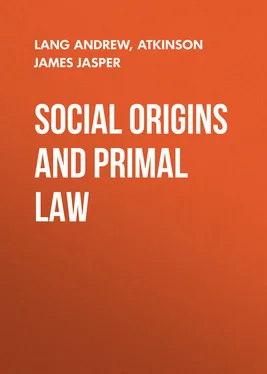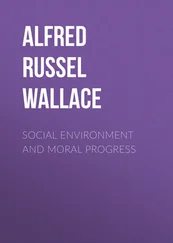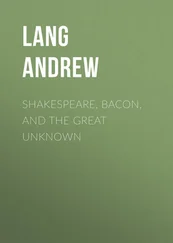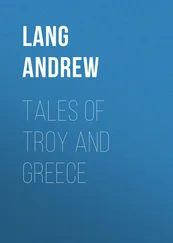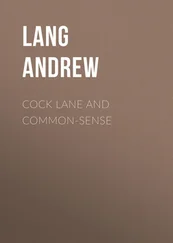Andrew Lang - Social Origins and Primal Law
Здесь есть возможность читать онлайн «Andrew Lang - Social Origins and Primal Law» — ознакомительный отрывок электронной книги совершенно бесплатно, а после прочтения отрывка купить полную версию. В некоторых случаях можно слушать аудио, скачать через торрент в формате fb2 и присутствует краткое содержание. Жанр: foreign_antique, foreign_prose, на английском языке. Описание произведения, (предисловие) а так же отзывы посетителей доступны на портале библиотеки ЛибКат.
- Название:Social Origins and Primal Law
- Автор:
- Жанр:
- Год:неизвестен
- ISBN:нет данных
- Рейтинг книги:3 / 5. Голосов: 1
-
Избранное:Добавить в избранное
- Отзывы:
-
Ваша оценка:
- 60
- 1
- 2
- 3
- 4
- 5
Social Origins and Primal Law: краткое содержание, описание и аннотация
Предлагаем к чтению аннотацию, описание, краткое содержание или предисловие (зависит от того, что написал сам автор книги «Social Origins and Primal Law»). Если вы не нашли необходимую информацию о книге — напишите в комментариях, мы постараемся отыскать её.
Social Origins and Primal Law — читать онлайн ознакомительный отрывок
Ниже представлен текст книги, разбитый по страницам. Система сохранения места последней прочитанной страницы, позволяет с удобством читать онлайн бесплатно книгу «Social Origins and Primal Law», без необходимости каждый раз заново искать на чём Вы остановились. Поставьте закладку, и сможете в любой момент перейти на страницу, на которой закончили чтение.
Интервал:
Закладка:
Mr. McLennan, who introduced the word 'exogamy,' defined it thus: 'an exogamous marriage is a marriage between persons of different clans of kinship, not entered into fortuitously, but because of law declaring it to be incest for a man to marry a woman of his own clan.' 26 26 Studies in Ancient History , second series, p. 265.
The same community cannot be 'both exogamous and endogamous,' as some suppose. Thus Lord Avebury writes, 'some races which are endogamous as regards the tribe, are yet exogamous as regards the gens.' But really 'exogamy is the law prohibiting marriage between persons of the same blood or stock as incest – often under pain of death – and endogamy is the law prohibiting marriage except between persons of the same blood or stock.' 27 27 Studies in Ancient History , second series, p. 46. In an appendix to Mr. Morgan's Ancient Society , Mr. McLennan's terms are severely criticised.
In Mr. McLennan's sense I shall take the word 'exogamy,' while dealing with peoples apparently nearest the beginning.
Later, when descent in the male line is established, the prohibition on marriage within the totem name comes to apply, sometimes, to marriage within the local district held by the men of the name. The old prohibition, we see, is to many within the recognised limit of the blood kinship, or stock, designated by the totem name. But, as tribes advance to kinship through males, and as, thereby, groups of one totem name come to possess one region of country, it often happens that exogamy prohibits marriage between persons dwelling in that region. Whereas Grouse was forbidden to marry Grouse; later, the Grouse living together, say in Corradale, the exogamous prohibition takes the shape 'persons dwelling in Corradale must marry out of Corradale.' The name marking the exogamous limit is now, in such cases, local, but the prohibition is derived from the older tabu on marriage between 'persons of the same blood or stock' – all those in Corradale being conceived to share the same blood or stock. This origin of 'local exogamy' must be kept in mind, otherwise confusion will arise. There are a few cases, even in Australia, where even local exogamy has become obsolete, and marriage, as with ourselves, is prohibited between persons of near kindred simply.
Now, if I may venture to interpret the mind of Mr. John Fergus McLennan, I conceive that he regarded the totemic division as older than the 'phratry' or the 'class' bar, and he thought it the oldest traceable exogamous limit. Not to marry within the totem name (no male Emu to marry a female Emu) was, in Mr. McLennan's opinion, the most archaic marriage law. 28 28 I shall call each set indicated by a totem name a 'totem group,' if the members live together; a 'totem kin,' if they are scattered through the tribe.
This appears from the words of Mr. McLennan's brother, Mr. Donald McLennan. 29 29 The Patriarchal Theory , pp. 6, 7, 1885.
He writes: 'As the theory of the Origin of Exogamy took shape, and the facts connected reduced themselves to form in his mind, the conclusion was reached that the system conveniently called "Totemism" … must have existed in rude societies, prior to the origin of Exogamy. 30 30 Meaning by Exogamy, not a mere tendency to marry out of the group, but a customary law with a religious sanction.
This carried back the origin of Totemism to a state of mind in which no idea of incest existed. From that condition my brother hoped to trace the progress of Totemism – necessarily a progress upwards – in connection with kinship and Exogamy. It may here be said that he had for a time a hypothesis of the origin of Totemism, but that he afterwards came to see that there were conclusive reasons against it.'
Meanwhile may we not, then, assume that, in Mr. McLennan's opinion, the earliest traceable human aggregate within which matrimony was legally forbidden was the totem kin, indicated by the totem name, the totem tabu, and the totem badge, or symbol – where it existed?
We now see how heterogeneous elements came to exist in the tribe of locality, a puzzle to the friends of the theory of the Patriarchal Family. For the nature of totemism, plus exogamy and female descent , is obviously such that under totemism, each family group even (each 'fire circle' of men, wives, and children), must contain persons of different totems. The father and mother must be of different totems (persons of the same totem not intermarrying), and the children must inherit the totem either of the father or of the mother. 31 31 Here the unusual case of the Arunta offers an exception to the rule; a point to be discussed later.
When paternal kinship is not only recognised (as, in practical life, it always is), but becomes exclusive in its influence on customary law, and when an approach to the Patriarchal Family, with the power of the patriarch, is evolved, all the members of the family in all its branches will (if Totemism persists) have the same totem; derived from the father. Thus there will now be a local totem group, a group mainly of the same totem name, as is practically the case in parts of Central Australia. 32 32 Spencer and Gillen, pp. 8-10.
It is necessary to understand this clearly. Take a very early group, in a given district; suppose it, at first, to be anonymous, and let it later be called the Emu group. So far, all members of the group will be Emus, they will form an Emu local group. But, next, suppose that there are many neighbouring groups, also at first anonymous; let them later be styled Rat, Cat, Bat, Sprat. Suppose that each such group now (for reasons to be indicated later) takes its wives not from within itself, but from all the other groups; that these women bring into the Emu group their group names; and that their children inherit their names from their mothers. Then the name, 'Emu group,' will cling to that local aggregate, as such; but, in time, the members of the Emu group will all be, say, Rats, Cats, Bats, and Sprats, so called from the group-names of their alien mothers. Suppose that, for one reason or another, children at last come to inherit their names and totems from their fathers. Then a Cat father will have Cat children, though his wives may still be of different totems, and his sons' children will also be Cats, and so the local group will become mainly, if not wholly, a group of one totem, the Cat. The Arunta of Central Australia do trace kinship in the male line, and thus there is 'one area which belongs to the Kangaroo men, another to Emu men, another to Hakea flower men,' and so on. This has reached such a pitch that 'in speaking of themselves the natives will refer to these local groups,' not by the prevalent totem names in each, but 'by the name of the locality which each of them inhabits,' namely, as men of the Iturkawura camp, and so on. 33 33 Ibid . pp. 8-9.
Thus we might say 'the Glen Nevis men,' 'the Corradale men,' and so on.
Thus we begin with an anonymous group, or group of unknown name, a local group. We introduce Totemism, and that group becomes a local group with a totem name. Granting exogamy (prohibition of marriage within the group), and reckoning in the female line, it soon developes into a local group made up of various totems, but, at first, as a local group , it probably retains its original totem name among its neighbours. Reckoning, still later, through the male line, we again meet, as at first, a local totem group, but already Totemism is on the wane, and the groups are soon to be called by the territorial names of their lands. At this stage totem names are tending to decay, and the next step will probably be to style the group by the name of some remembered, or mythical, male ancestor, such as 'children of Donald' – Macdonalds.
Читать дальшеИнтервал:
Закладка:
Похожие книги на «Social Origins and Primal Law»
Представляем Вашему вниманию похожие книги на «Social Origins and Primal Law» списком для выбора. Мы отобрали схожую по названию и смыслу литературу в надежде предоставить читателям больше вариантов отыскать новые, интересные, ещё непрочитанные произведения.
Обсуждение, отзывы о книге «Social Origins and Primal Law» и просто собственные мнения читателей. Оставьте ваши комментарии, напишите, что Вы думаете о произведении, его смысле или главных героях. Укажите что конкретно понравилось, а что нет, и почему Вы так считаете.
